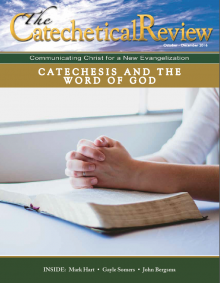One of the words particularly beloved of Pope Francis, is the Greek parrhēsia.[i] It is also a significant word for all who hand on the faith of the Church: parents, priests and religious, catechists in parishes, and teachers in schools. We could go so far as to say that it sums up for us how we should learn to catechize for the new evangelization.
Every page of the Catechism’s text is characterized by this quality of parrhēsia. The Catechism explains that the word means “straightforward simplicity, filial trust, joyous assurance, humble boldness, the certainty of being loved,”[ii] reminding us that we can speak with “straightforward simplicity” precisely because of our filial trust in the Lord; we can speak with “humble boldness” because of the certainty we have of his love for us.
The rest of this online article is available for current Guild members.
This article is from The Catechetical Review (Online Edition ISSN 2379-6324) and may be copied for catechetical purposes only. It may not be reprinted in another published work without the permission of The Catechetical Review by contacting [email protected]

















